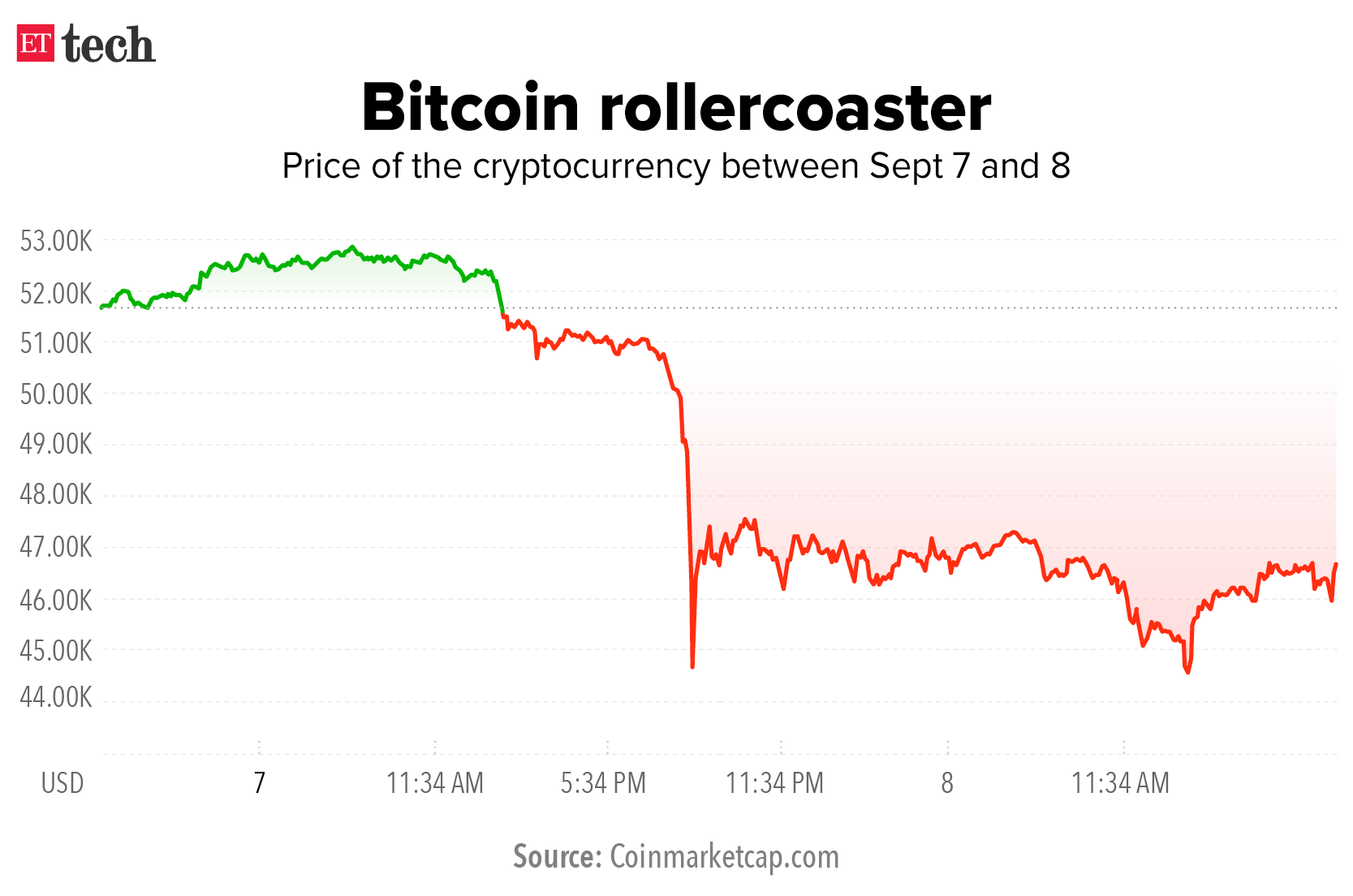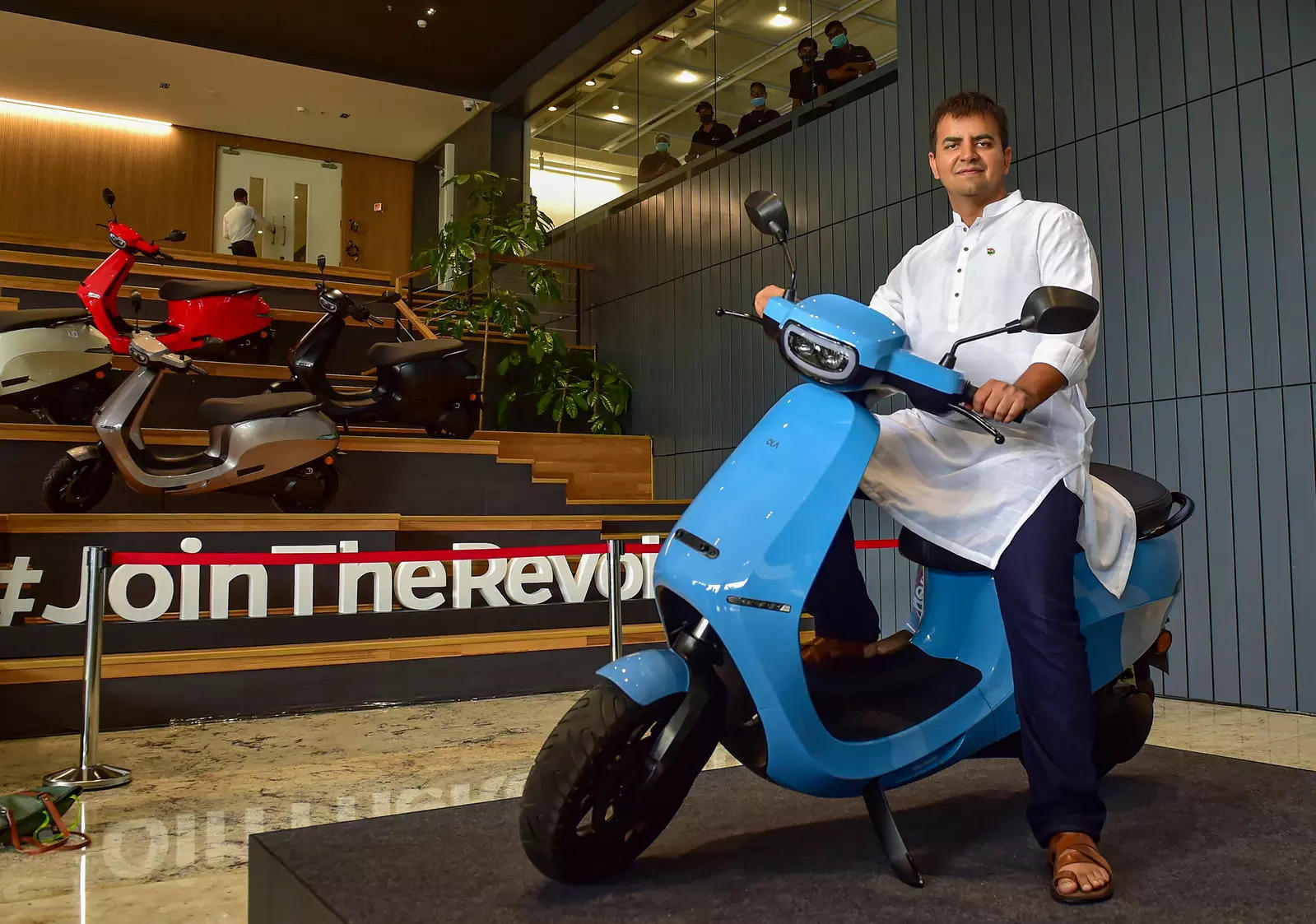The Crypto rollercoaster; upset chipmaker’s letter to PM
Also in this letter:
- ‘Disappointed, demoralised’, chipmaker writes to PM Modi
iD Fresh Food files complaints over smear campaign- Ola’s scooter rollout sees glitches, CEO apologises
It was coming, experts say, after Bitcoin’s flash crash
Bitcoin slid to below $45,000 on Tuesday from a four-month high of about $52,000, hours after it debuted as legal tender in El Salvador, the first country to do so.
Why? Experts attributed the 15% ‘flash crash’ to a lack of liquidity in crypto markets, which could give disproportionate power to large holders, and the fact that crypto markets are highly sentiment-driven and lack proper regulation.

Automated trading programs that sell or buy at pre-set prices, could have also added to the pressure.
Not just Bitcoin: Other cryptocurrencies such as Ethereum, Binance Coin and Cardano also fell between 13% and 18% on Tuesday. Dogecoin dropped 33% at one point.
In India, many traders ended up buying the dip. WazirX’s daily trading volume increased to $280 million from the usual $100-$150 million, its chief executive and cofounder Nischal Shetty said.
Volatility built in: Unlike traditional stock markets, they said, crypto markets lack circuit breakers, which are triggered when an index or a stock crosses a set threshold. Wild swings are thus a standard feature of cryptocurrency markets, they added.
It was coming: Experts and traders said they were not surprised by the tumble. “Crypto markets, though growing, aren’t as liquid as traditional financial markets. If there is more liquidity, this [flash crash] is less likely to happen,” Shetty said. He added, however, that there is no data to conclusively explain why a flash crash happens.
Retail investors we spoke to said they have made peace with crypto’s volatile nature. Sanil Mahajan, head of supply chain at a large IT company, said, “One can almost predict the unpredictability of crypto now. I started getting a sense of it last week when a few cryptocurrencies broke through to reach an annual high. These are typical signs of a ‘pump and dump’ scheme, and signal that a big crash is coming in a few days.”
Disappointed and demoralised, chipmaker writes in letter to PM

Tower Semiconductor, an Israel-based semiconductor foundry, sent a letter to Prime Minister Narendra Modi, asking him to help fast-track a government proposal for chip manufacturing, for which it had floated an expression of interest (EoI) nine months ago.
May pull out: The company said that any more delays from the government would make it unable to “stay active in the project in the near future”.
“We are disappointed and demoralised that in spite of the highest G2G level discussion for the proposed semiconductor fab… there is no clue where we are heading,” the letter said.
“We would request you to kindly explicitly articulate and convey the limitations of GoI (Government of India) and its stakeholder without further delay, else we express our inability to stay active in the project in near future,” it added.
Three-billion-dollar pitch:
The letter was also marked to finance minister Nirmala Sitharaman, electronics and IT minister Ashwini Vaishnaw, and commerce and industry minister Piyush Goyal. Sources said Vaishnaw, who took over as IT minister about two months ago, had a call with the consortium last week to understand various issues and assure it of the government’s support.
Tata’s semiconductor plans: Last month we reported that the Tata Group could soon enter semiconductor manufacturing, aiming for a slice of the high-tech electronics manufacturing market that’s pegged at $1 trillion. “At the Tata Group, we have already pivoted into a number of new businesses like electronics manufacturing, 5G network equipment as well as semiconductors, in all probability,” said N Chandrasekaran, chairman of Tata Sons.
Tweet of the day
ETtech Done Deals

■ Notion, a work collaboration company that was valued at more than $2 billion last year, has acquired Hyderabad-based Automate.io in a cash-and-stock deal. Notion will absorb Automate.io’s entire 40-member team, which will continue to operate in Hyderabad.
■ Edtech startup Leap has raised $55 million in a Series C funding round led by Owl Ventures. The company will use the funds to extend its service suite to students across Southeast Asia, and Middle East and North Africa regions.
■ College admissions platform CollegeDekho has landed $26.5 million in a Series B funding round led by Winter Capital Partners, ETS Strategic Capital, Calega and existing investors Man Capital and Rajeev Chaba.
■ Vahdam India, a wellness brand, has bagged Rs 174 crore in a Series D funding round led by IIFL AMC’s private equity fund. The capital will be used to expand the company’s online and offline distribution, enter new markets and foray into new complementary categories.
■ WeRize, a financial services platform, has secured $8 million in a Series A funding round led by 3one4 Capital, Kalaari Capital, Picus Capital and Orios Venture Partners. The capital will be used to ramp up investments in technology and grow the partners’ network to more than 50,000 in the next two years.
■ PayPal is acquiring Japanese ‘buy now, pay later’ (BNPL) firm Paidy in a $2.7 billion largely cash deal, taking another step to claim the top spot in an industry witnessing a pandemic-led boom.
iD Fresh Food files complaints over smear campaign

PC Musthafa, cofounder and CEO, iD Fresh Food
Billionaire Azim Premji-backed packaged food company iD Fresh Food on Wednesday filed a complaint with the cybercrime cell of the Bengaluru city police, and also with WhatsApp, seeking action against people who have mounted a campaign targeting its products on the messaging platform and social media websites.
What happened? According to the Bengaluru-based company, which makes idli and dosa batter, among other things, it has been receiving social media messages in the past few days that carried “misleading and false information” alleging that it used animal extracts in its products.
The company denied what it called are “baseless allegations that are purely intended at maligning the brand”. “We condemn the spread of such malicious rumours and misinformation and have taken the legal route to rightfully tackle this issue,” it said in a statement.
Coursera is stepping up its India play amid edtech boom

Coursera Inc. is joining hands with Indian institutions and introducing platform innovations to better serve learners in its biggest market outside of the US.
The online courses provider has 12.5 million registered learners in India. About 7.5 million of these signed up since January 2020, making the country the fastest growing market for the American company. Coursera has also elevated India as the hub of its Asia Pacific (APAC) operations.
Quote: “The pandemic has dramatically changed the way we learn, teach, and work. Our strong momentum in India reflects the continued trend of individuals and institutions embracing online learning to develop skills for a digital future,” Coursera CEO Jeff Maggioncalda said.
New partners: The company is partnering with four new higher education institutions in India, taking the total number of university partners to 10. New partners include IIT Bombay, IIT Guwahati, Indian Statistical Institute and Ashoka University, according to the statement.
Ola’s founder apologises for technical glitches in scooter rollout

Ola founder Bhavish Aggarwal on Wednesday apologised for not meeting the expectations of customers who were unable to purchase its S1 electric scooters owing to technical issues.
At its launch, Ola had announced that the electric scooters would be available for purchase from September 8 and that home deliveries would start from October.
Ola said customers will now be able to buy its scooters from September 15. The company began taking pre-orders for its electric scooter on July 15 and claimed to have received over one lakh bookings in the first 24 hours.
In an interview with ET last month, Aggarwal had said that all two-wheelers sold in the country by 2025 should be electric.
On Monday, the company tied up with leading banks and financial institutions, including HDFC Bank, ICICI Bank, Kotak Mahindra Prime and TATA Capital, to provide loans to buyers of its electric scooters.
Other Top Stories We Are Covering
Pandemic increased shift to subscription model in India, says Nutanix CEO: Nutanix chief executive Rajiv Ramaswami said the Covid-19 pandemic had increased a shift to its subscription model in India as customers focused on saving costs in the early days of the virus outbreak.
Prativa Mohapatra becomes the first woman to lead Adobe India: Adobe Inc. has appointed Prativa Mohapatra as vice president and managing director for Adobe India, making her the first woman to lead the global software maker’s operations in the country.
Cognizant seeks nod for $95 million settlement: IT services provider Cognizant has sought preliminary approval from a New Jersey district judge to settle a class action suit for $95 million and put to rest an alleged bribery case in India in which two of its former executives are allegedly involved.
Global Picks We Are Reading
- ByteDance is in talks to borrow up to $5 billion to fund overseas expansion (The Information)
- How Facebook undermines privacy protections for its billion WhatsApp users (ProPublica)
- Facebook slams UK watchdog’s Call to sell Giphy (Bloomberg)
( News Source :Except for the headline, this story has not been edited by Rashtra News staff and is published from a economictimes.indiatimes.com feed.)
Related searches :





